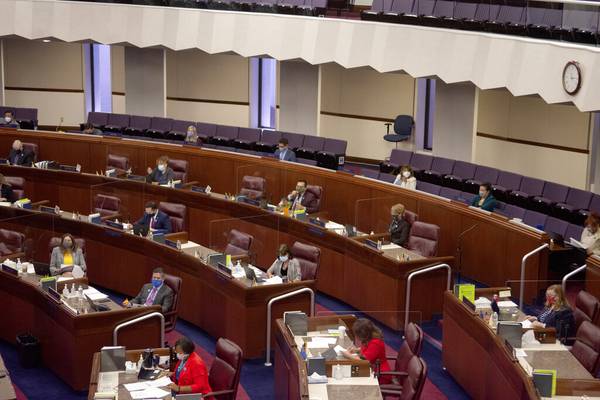CARSON CITY — Lawmakers in the Nevada Assembly on Friday passed a bill designed to make voting in the November general election more accessible and safe out of coronavirus concerns.
The bill, which is activated in declared emergencies such as the pandemic, would require a mail-in ballot to be sent to all active voters no later than 20 days before the election.
The bill passed on a party-line vote in the Democratic-controlled Assembly, with Assemblyman Chris Edwards, R-Henderson, absent. The Senate took the bill up late Friday night but did not take a vote.
Election reform is one of the issues lawmakers are addressing in the special session, which began Friday.
The bill requires in-person voting locations based on population rates. Clark County must have at least 100 in-person voting sites, Washoe County must have at least 25 and each other county must have at least one.
The bill would also establish physical early voting locations. Clark County would have 35 in-person sites, Washoe County would have 17 and every other county would have one.
“Voters will now have the options in a manner that is the most safe, secure and convenient for their health,” said Assemblywoman Sandra Jauregui, D-Las Vegas. “That includes in person and mail.”
The provisions can go into effect in elections held during a declared emergency. For primary elections, an emergency has to be declared by the March 1 preceding the election. For a general election, the emergency needs to be declared by the July 1 preceding the election.
The governor would be able to declare an emergency affecting the elections after those dates if it is found that election officials or voters would be put in danger and that election officials have enough time to implement the changes.
Many Republicans spoke out against the bill, with one of the main issues being an allowance for voters to hand-deliver their ballots. Assemblyman Jim Wheeler, R-Minden, compared a voter’s ballot to a winning California lottery ticket, stating that a lottery winner wouldn’t trust their ticket to another person or the mail system.
“You’re going to get in your car and you’re going to take it directly to the place where you can get it (redeemed),” Wheeler said. “And I’d like everyone in this room to please think of your vote as just as important.”
Republican Secretary of State Barbara Cegavske said that she was not included in the bill’s drafting, though her office had attempted to be involved. Cegavske said that her office received a copy of the bill at the time it was made public, shortly before it was heard in the Assembly.
“We did try and attempt several times … for the last couple months to get involved and be involved in the process of this bill,” Cegavske said.
Cegavske’s office had not been preparing for a mail-in election in November. Wayne Thorley, the deputy secretary of state for elections, said that most of the funding from the federal Coronavirus Aid, Relief, and Economic Security Act that went to the state for elections was spent on the June primary — almost $4.5 million in total.
The bill passed in the Assembly would send $3 million to the secretary of state’s office for the rollout of mail-in ballots.
The bill received much public comment from both progressives in favor of the measure and those who were concerned an expansion of mail-in voting would increase the chance of voter fraud.
There has been no evidence that mail-in voting leads to any substantial increase in voter fraud, and Cegavske, in response to a lawmaker’s questions, said no evidence of voter fraud was found in the June primary.

